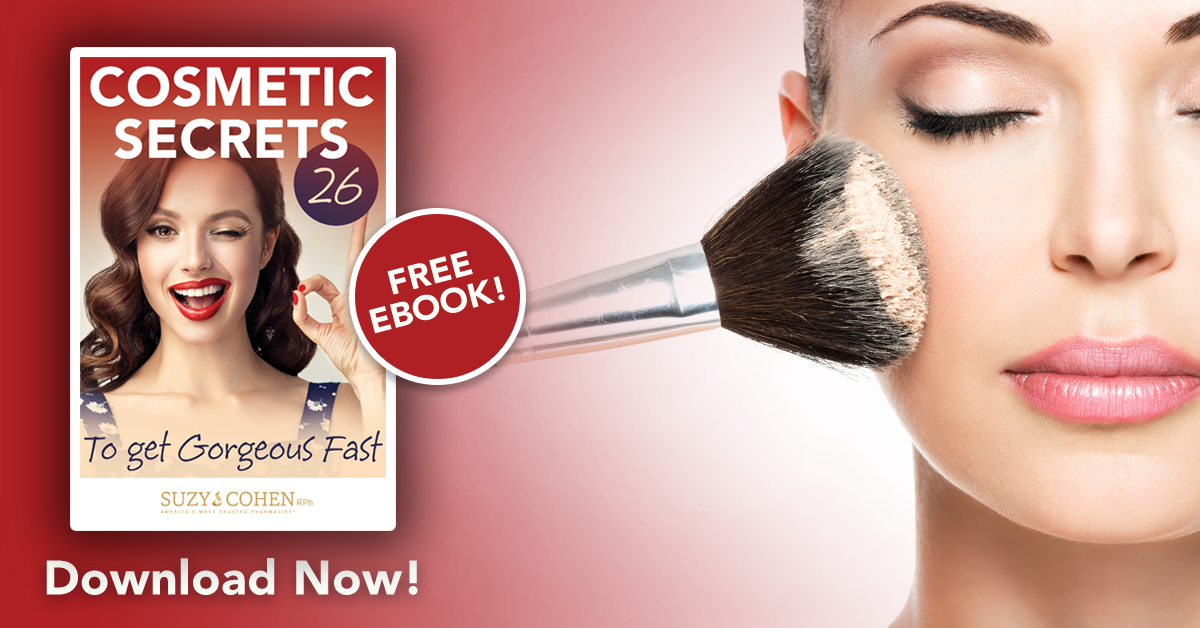Parabens are a category of preservatives used in cosmetics, medications and foods. If you read labels you’ll see them listed by their name or an E number such as methylparaben (E218), ethylparaben (E214), propylparaben (E216), heptylparaben (E209) and butylparaben.
Parabens may or may not be associated with cancer; there’s a lot of controversy around that. It has been reported in the past that parabens are found in 99% of breast tumors, however, there is no evidence that they cause breast cancer. Also, keep in mind many factors have to exist in order to develop cancer. There was a 2013 study entitled “Combinations of parabens at concentrations measured in human breast tissue can increase proliferation of MCF-7 human breast cancer cells.”
Parabens mimic estrogen, the female hormone. They’re sticky too; they don’t seem to let go of the tissue once inside it. This is why they are best avoided, especially for people with hormone-related diseases.
The argument for parabens is that your foods and personal care items must be resistant to bacteria, mold and yeast, so of course a preservative is crucial. The food, pharmaceutical and cosmetic industries frequently rely on strong synthetic chemicals like sulfites, propionates, EDTA, formaldehyde, alcohol or paraben chemicals. They are trying to protect us from germs. But that doesn’t mean what they’re using to protect us is right for everyone. Parabens can be found in what we eat, what we put on our body, even in medications!
Foods
It’s common to find parabens in some brands of sauces, chutneys, jams, pickles, ice cream, soft drinks, desserts, broths or processed vegetables and flavoring syrups. I encourage you to read labels on everything you plan to eat!
Beauty and Personal Care Products
Whether you use antiperspirants, makeup, toothpaste, face creams or moisturizers, you are almost certainly exposing yourself to parabens. But how many? Is it every product? You do have choices, they are not in everything; you should begin reading labels and researching. There’s a website that exposes the ingredients of dental products, fragrances, cosmetics, skin care products and much more: Skin Deep. I told you about this site about many years ago, and it’s gotten considerably more comprehensive: www.ewg.org/skindeep. I searched the word “paraben” and it picked up over 30,000 products in its database. It’s easy today to avoid this preservative in beauty products, but you have to look harder and read labels. There are trustworthy brands out there. Many manufacturers have found effective alternatives to parabens to prevent microbial growth in personal care products.
Medications.
Parabens are in hundreds of medications as a preservative with no pharmacologic activity. They’re commonly found in some asthma and steroid inhalers. Manufacturers say parabens are completely absorbed upon ingestion and broken down to para-hydroxybenzoic acid, and metabolites are supposedly sent out from your urine. Depending on who you ask, or what lab test you read, there may be no evidence of accumulation. And parabens are obviously regarded as “safe” by the United States FDA. I wouldn’t concern yourself with parabens if they’re in your medication(s) since the actual medication itself is just as synthetic as the paraben! Plus, they are more easily avoided in food and personal care products.
However, if you feel concerned about parabens for yourself or your family, my best advice to you is simply educate yourself and read labels. They can be avoided.
CLICK LIKE to FOLLOW Suzy Cohen – Get Important Health Tips

Suzy Cohen, has been a licensed pharmacist for over 30 years and believes the best approach to chronic illness is a combination of natural medicine and conventional. She founded her own dietary supplement company specializing in custom-formulas, some of which have patents. With a special focus on functional medicine, thyroid health and drug nutrient depletion, Suzy is the author of several related books including Thyroid Healthy, Drug Muggers, Diabetes Without Drugs, and a nationally syndicated column.

